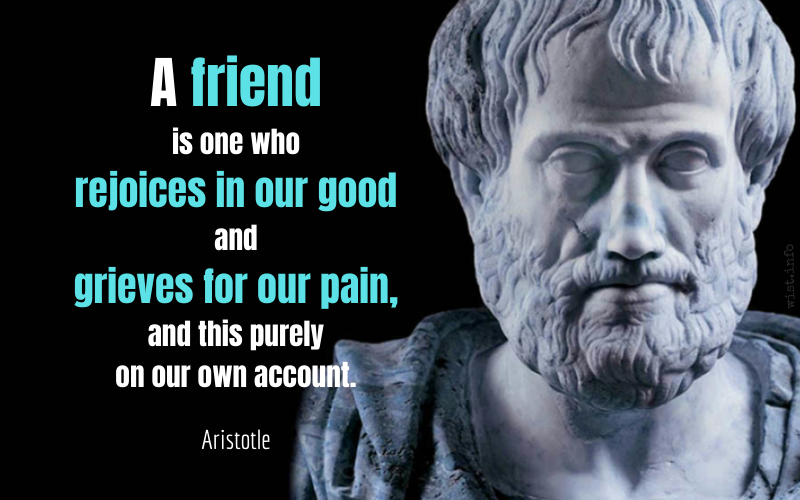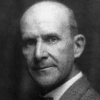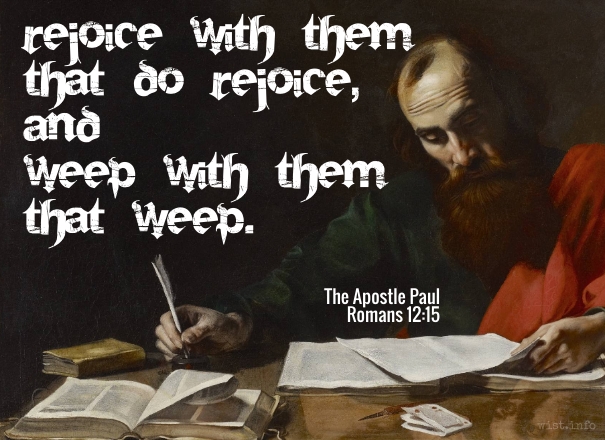LEONATO: No, no, t’is all men’s office to speak patience
To those that wring under the load of sorrow;
But no man’s virtue nor sufficiency,
To be so moral, when he shall endure
The like himself.William Shakespeare (1564-1616) English dramatist and poet
Much Ado About Nothing, Act 5, sc. 1, l. 29ff (5.1.29-33) (1598)
(Source)
Quotations about:
sympathy
Note not all quotations have been tagged, so Search may find additional quotes on this topic.
LEONATO:For, brother, men
Can counsel, and speak comfort to that grief
Which they themselves not feel.William Shakespeare (1564-1616) English dramatist and poet
Much Ado About Nothing, Act 5, sc. 1, l. 22ff (5.1.22-24) (1598)
(Source)
I don’t know ov a better kure for sorrow than tew pity sum boddy else.
[I don’t know of a better cure for sorrow than to pity somebody else.]
But one cannot weep for the entire world. It is beyond human strength. One must choose.
[On ne peut pleurer pour le monde entier : C’est au-delà des forces humaines. Il faut choisir!]
Jean Anouilh (1910-1987) French dramatist
Cecile; or The School for Fathers [L’Ecole Des Peres] [The Chevalier] (1951) [tr. Klein (1956)]
(Source)
There will always be a lost dog somewhere that will prevent me being happy.
[Il y aura toujours un chien perdu quelque part qui m’empêchera d’être heureux.]
Nobody knows the trouble we’ve seen — but we keep trying to tell them.
Mignon McLaughlin (1913-1983) American journalist and author
The Second Neurotic’s Notebook, ch. 4 (1966)
(Source)
In the theater, as in life, we prefer a villain with a sense of humor to a hero without one.
Mignon McLaughlin (1913-1983) American journalist and author
The Neurotic’s Notebook, ch. 7 (1963)
(Source)
You can’t save others from themselves because those who make a perpetual muddle of their lives don’t appreciate your interfering with the drama they’ve created. They want your poor-sweet-baby sympathy, but they don’t want to change. This is a truth I never seem to learn.
Man’s best possession is a sympathetic wife.
[ἄριστον ἀνδρὶ κτῆμα συμπαθὴς γυνή]
Euripides (485?-406? BC) Greek tragic dramatist
Antigone [Ἀντιγόνη], frag. 164 (TGF) (c. 420-406 BC)
(Source)
(Source (Greek)). Alternate translation:
The best thing for a husband is an understanding wife.
[Source]
Between justice and respect there is this difference, that it is the part of justice not to injure; of respect, not to offend. In this the force of propriety is extremely clear.
[Est autem, quod differat in hominum ratione habenda inter iustitiam et verecundiam. Iustitiae partes sunt non violare homines, verecundiae non offendere; in quo maxime vis perspicitur decori.]
Marcus Tullius Cicero (106-43 BC) Roman orator, statesman, philosopher
De Officiis [On Duties; On Moral Duty; The Offices], Book 1, ch. 28 (1.28) / sec. 99 (44 BC) [tr. McCartney (1798)]
(Source)
Verecundia is usually translated as "modesty," but Cicero is using a more complex sense here, leading to a variety of translations. Peabody translates it as "courtesy" that is "part of or a consequence of modesty." Edmonds (at length) considers the term untranslatable here, "an inward abhorrence of moral turpitude, through which the conscience is awed, and may be said to blush."
(Source (Latin)). Alternate translations:
But here we must observe, that there is a great deal of difference between that which justice, and that which this modesty, respect, or reverence demands, in relation to other people. It is the duty of justice, not to injure or wrong any man; of respect, or reverence, not to do anything that may offend or displease him; wherein more especially the nature of that decorum we are speaking of consists.
[tr. Cockman (1699)]
But, in our estimate of human life, we are to make a difference between justice and moral susceptibility. The dictate of justice is to do no wrong; that of moral susceptibility is to give no offense to mankind, and in this the force of the graceful is most perceptible.
[tr. Edmonds (1865)]
But in the treatment of men there is a difference between justice and courtesy. It is the part of justice not to injure men; of courtesy, not to give them offence, and it is in this last that the influence of becomingness is most clearly seen.
[tr. Peabody (1883)]
In our social relations there is a difference between justice and sympathy. Not to wrong our fellow-men is the function of justice: that of sympathy is not to wound their feelings; herein the power of decorum is most conspicuous.
[tr. Gardiner (1899)]
There is, too, a difference between justice and considerateness in one's relations to one's fellow-men. It is the function of justice not to do wrong to one's fellow-men; of considerateness, not to wound their feelings; and in this the essence of propriety is best seen.
[tr. Miller (1913)]
Moreover, in maintaining distinctions among men there is a degree of difference between justice and decent respect. The duty of justice is not to do violence to men. The duty of decent respect is not to insult them; this latter especially reveals the essence of decorum.
[tr. Edinger (1974)]
Even here
Worth wins her due, and there are tears to flow,
And human hearts to feel for human woe.[Sunt hic etiam sua praemia laudi,
Sunt lacrimae rerum et mentem mortalia tangunt.]Virgil (70-19 BC) Roman poet [b. Publius Vergilius Maro; also Vergil]
The Aeneid [Ænē̆is], Book 1, l. 461ff (1.461-462) (29-19 BC) [tr. Taylor (1907), st. 61, l. 543ff]
(Source)
Aeneas, on seeing murals of the Trojan Wars in Carthage. (Source (Latin)). Alternate translations:
Lo! Priam here, reward here vertue finds;
Troy teares, and humane sufferings pittying minds.
[tr. Ogilby (1649)]
Ev'n the mute walls relate the warrior's fame,
And Trojan griefs the Tyrians' pity claim.
[tr. Dryden (1697)]
Even here praiseworthy deeds meet with due reward: here are tears for misfortunes, and the breasts are touched with human woes.
[tr. Davidson/Buckley (1854)]
Aye, praise waits on worth
E'en in this corner of the earth;
E'en here the tear of pity springs,
And hearts are touched by human things.
[tr. Conington (1866)]
Worthy deeds e'en here are praised.
And mortal sufferings move their thoughts and tears.
[tr. Cranch (1872), l. 601ff]
Here too is the meed of honour, here mortal estate touches the soul to tears.
[tr. Mackail (1885)]
And even here belike deed hath its own reward.
Lo here are tears for piteous things that touch men's hearts anigh.
[tr. Morris (1900)]
Virtue's wage is given --
O even here! Here also there be tears
for what men bear, and mortal creatures feel
each other's sorrow.
[tr. Williams (1910)]
Here, too, virtue has its due rewards; here, too, there are tears for misfortune and mortal sorrows touch the heart.
[tr. Fairclough (1916)]
Look! even here there are rewards for praise,
There are tears for things, and what men suffer touches
The human heart.
[tr. Humphries (1951)]
Here too we find virtue somehow rewarded.
Tears in the nature of things, hearts touched by human transience.
[tr. Day Lewis (1952)]
Here, too, the honorable finds its due
and there are tears for passing things; here, too,
things mortal touch the mind.
[tr. Mandelbaum (1971), l. 654ff]
Even so far away
Great valor has due honor; they weep here
For how the world goes, and our life that passes
Touches their hearts.
[tr. Fitzgerald (1981), l. 627ff]
Here too there is just reward for merit, there are tears for suffering and men's hearts are touched by what man has to bear.
[tr. West (1990)]
Here too virtue has its rewards, here too
there are tears for events, and mortal things touch the heart.
[tr. Kline (2002)]
Here, too, honor matters;
Here are the tears of the ages, and minds touched
By human suffering.
[tr. Lombardo (2005)]
Even here, merit will have its true reward ...
even here, the world is a world of tears
and the burdens of mortality touch the heart.
[tr. Fagles (2006)]
Here too, glory has its rewards; the world weeps, and mortal matters move the heart.
[tr. Bartsch (2021)]
There iz nothing that a man kan do that should cut him off from pitty, the fakt that he iz human should always entitle him to commiserashun.
[There is nothing that a man can do that should cut him off from pity; the fact that he is human should always entitle him to commiseration.]
Josh Billings (1818-1885) American humorist, aphorist [pseud. of Henry Wheeler Shaw]
Everybody’s Friend, Or; Josh Billing’s Encyclopedia and Proverbial Philosophy of Wit and Humor, “Plum Pits” (1874)
(Source)
A friend is one who rejoices in our good and grieves for our pain, and this purely on our own account.
[τούτων δὲ ὑποκειμένων ἀνάγκη φίλον εἶναι τὸν συνηδόμενον τοῖς ἀγαθοῖς καὶ συναλγοῦντα τοῖς λυπηροῖς μὴ διά τι ἕτερον ἀλλὰ δι᾽ ἐκεῖνον.]
Aristotle (384-322 BC) Greek philosopher
Rhetoric [Ῥητορική; Ars Rhetorica], Book 2, ch. 4, sec. 3 (2.4.3) / 1381a (350 BC) [tr. Jebb (1873)]
(Source)
(Source (Greek)). Alternate translations:
- "He who rejoices with one in prosperity, and sympathises with one in pain, not with a view to anything else but for his friend's sake, is a friend." [Source (1847)]
- "One who participates in another's joy at good fortune, and in his sorry at what aggrieves him, not from any other motive, but simply for his sake, is his friend." [tr. Buckley (1850)]
- "Your friend is the sort of man who shares your pleasure in what is good and your pain in what is unpleasant, for your sake and for no other reason." [tr. Roberts (1924)]
- "He is a friend who shares our joy in good fortune and our sorrow in affliction, for our own sake and not for any other reason." [tr. Freese (1926)]
- "The following people are our friends: those who share our pleasure when good things happen and our distress when bad things happen for no other reason than for our sake." [tr. Waterfield (2018)]
- "A friend is one who shares in the other fellow's pleasure at the good things and his pain at what is grievous, for no other reason than that fellow's sake." [tr. Bartlett (2019)]
- "A friend is someone who is a partner in our happiness and a partner in our sorrow not for any other reason but for friendship." [tr. @sentantiq (2019)]
It can be very dangerous to see things from somebody else’s point of view without the proper training.
What makes people hard-hearted is this, that each man has, or thinks he has, as much as he can bear in his own troubles.
[Was die Menschen hartherzig macht, is Dieses, daß jeder an seinen eigenen Plagen genug zu tragen hat, oder doch es meint.]
Arthur Schopenhauer (1788-1860) German philosopher
Parerga and Paralipomena, Vol. 2, ch. 26 “Psychological Observations [Psychologische Bemerkungen],” § 325 (1851) [tr. Saunders (1890)]
(Source)
(Source (German)). Alternate translation:
What makes a man hard-hearted is this, that each man has, or fancies he has, sufficient in his own troubles to bear.
[tr. Dircks]
It is by means of my vices that I understand yours.
Ralph Waldo Emerson (1803-1882) American essayist, lecturer, poet
Journal (1844, Spring-Summer)
(Source)
He recorded this phrase multiple times, including in his lecture, "The Anglo-American" (7 Dec 1852), and Notebook S Salvage.
Tolerance, good temper and sympathy — they are what matter really, and if the human race is not to collapse they must come to the front before long.
E. M. Forster (1879-1970) English novelist, essayist, critic, librettist [Edward Morgan Forster]
“What I Believe,” The Nation (16 Jul 1938)
(Source)
Your Honor, years ago I recognized my kinship with all living beings, and I made up my mind then that I was not one bit better than the meanest on earth. I said then, and I say now, that while there is a lower class, I am in it; and while there is a criminal element, I am of it; and while there is a soul in prison, I am not free.
Eugene V. Debs (1855-1926) American union leader, activist, socialist, politician
Statement to the Court (1918-09-18)
(Source)
On being convicted of sedition for urging resistance to the draft. Often paraphrased:
As long as there is a lower class, I am in it. As long as there is a criminal element, I am of it. As long as there is a soul in prison, I am not free.
Economic privation proceeds by easy stages, and so long as men suffer it patiently the outside world cares little.
John Maynard Keynes (1883-1946) English economist
The Economic Consequences of the Peace, ch. 6 (1919)
(Source)
Rejoice with them that do rejoice, and weep with them that weep.
The Bible (The New Testament) (AD 1st - 2nd C) Christian sacred scripture
Romans 12:15 [KJV]
Quoting 12:15-18: "Rejoice with those who rejoice, and weep with those who weep. Be of the same mind toward one another; do not be haughty in mind, but associate with the lowly Do not be wise in your own estimation. Never pay back evil for evil to anyone Respect what is right in the sight of all men. If possible, so far as it depends on you, be at peace with all men."
The more you are drawn to put yourself in the place of the other person, the more you feel the pain inflicted upon him, the insult offered him, the injustice of which he is a victim, the more you will be urged to act so that you may prevent the pain, insult, or injustice.
I never yet heard man or woman much abused, that I was not inclined to think the better of them; and to transfer any suspicion or dislike to the person who appeared to take delight in pointing out the defects of a fellow-creature.
Jane Porter (1776-1850) English historical novelist and dramatist
Aphorisms of Sir Philip Sidney, Vol. 2, “Falsehood, Treachery, and Slander,” #19, Remark (1807)
(Source)
I do not believe that any man can lead who does not act, whether it be consciously or unconsciously, under the impulse of a profound sympathy with those whom he leads — a sympathy which is insight — an insight which is of the heart rather than of the intellect.
Woodrow Wilson (1856-1924) US President (1913-20), educator, political scientist
“Leaders of Men,” Commencement Address, University of Tennessee, Knoxville (17 Jun 1890)
(Source)
The pat on the back, the arm around the shoulder, the praise for what was done right, and the sympathetic nod for what wasn’t, are as much a part of golf as life itself.
He whose Belly is full, believes not him whose is empty.
Thomas Fuller (1654-1734) English physician, preacher, aphorist, writer
Gnomologia: Adages and Proverbs, #2399 (1732)
(Source)
You can’t do the biggest things in this world unless you handle men; and you can’t handle men if you’re not in sympathy with them; and sympathy begins in humility.
George Horace Lorimer (1867-1937) American journalist, author, magazine editor
Old Gorgon Graham: More Letters from a Self-Made Merchant to His Son, ch. 12 (1903)
(Source)
To hear complaints with patience, even when complaints are vain, is one of the duties of friendship.
Samuel Johnson (1709-1784) English writer, lexicographer, critic
The Rambler, #59 (9 Oct 1750)
(Source)
Depend upon it if a man talks of his misfortunes there is something in them that is not disagreeable to him; for where there is nothing but pure misery there never is any recourse to the mention of it.
Samuel Johnson (1709-1784) English writer, lexicographer, critic
Comment (1780)
(Source)
In Boswell, The Life of Samuel Johnson, ch. 51 "1780" (1791)
It is in our faults and failings, not in our virtues, that we touch one another and find sympathy. We differ widely enough in our nobler qualities. It is in our follies that we are at one.
Jerome K. Jerome (1859-1927) English writer, humorist [Jerome Klapka Jerome]
Idle Thoughts of an Idle Fellow, “On Vanity and Vanities” (1886)
(Source)
Poetry demands a man with special gift for it, or else one with a touch of madness in him; the former can easily assume the required mood, and the latter may be actually beside himself with emotion.
[διὸ εὐφυοῦς ἡ ποιητική ἐστιν ἢ μανικοῦ: τούτων γὰρ οἱ μὲν εὔπλαστοι οἱ δὲ ἐκστατικοί εἰσιν.]
Aristotle (384-322 BC) Greek philosopher
Poetics [Περὶ ποιητικῆς, De Poetica], ch. 17 / 1455a.33 (c. 335 BC) [tr. Bywater (1909)]
(Source)
Original Greek. Fyfe (below) notes μανικός to mean "genius to madness near allied," and adds "Plato held that the only excuse for a poet was that he couldn't help it." A possible source of Seneca's "touch of madness" attribution to Aristotle. Alternate translations:
Poetry implies either a happy gift of nature or a strain of madness. In the one case a man can take the mould of any character; in the other, he is lifted out of his proper self.
[tr. Butcher (1895)]
Poetry is the work for the finely constituted or the hysterical; for the hysterical are impressionable, whereas the finely constituted are liable to outbursts.
[tr. Margoliouth (1911); whiles this seems backward, Margoliouth further explains in his footnote.]
Poetry needs either a sympathetic nature or a madman, the former being impressionable and the latter inspired.
[tr. Fyfe (1932)]
Hence the poetic art belongs either to a naturally gifted person or an insane one, since those of the former sort are easily adaptable and the latter are out of their senses.
[tr. Sachs (2006)]
In order to write tragic poetry, you must be either a genius who can adapt himself to anything, or a madman who lets himself get carried away.
[tr. Kenny (2013)]
Zigong asked, Is there a single word that can guide a person’s conduct throughout life?
The Master said, That would be reciprocity, wouldn’t it? What you do not want others to do to you, do not do to others.[子貢問曰、有一言、而可以終身行之者乎。
子曰、其恕乎、己所不欲、勿施於人。]Confucius (c. 551- c. 479 BC) Chinese philosopher, sage, politician [孔夫子 (Kǒng Fūzǐ, K'ung Fu-tzu, K'ung Fu Tse), 孔子 (Kǒngzǐ, Chungni), 孔丘 (Kǒng Qiū, K'ung Ch'iu)]
The Analects [論語, 论语, Lúnyǔ], Book 15, verse 24 (15.24) (6th C. BC – AD 3rd C.) [tr. Watson (2007)]
(Source)
See also 5.12. Compare to the Bible, Matthew 7:12.
Legge and other earlier translators, as noted below, identified this as 15.23.
(Source (Chinese)). Alternate translations:
Tsze-kung asked, saying, "Is there one word which may serve as a rule of practice for all one's life?"
The Master said, "Is not RECIPROCITY such a word? What you do not want done to yourself, do not do to others."
[tr. Legge (1861), 15.23]
Tsz-kung put to him the question, "Is there one word upon which the whole life may proceed?" The Master replied, "Is not RECIPROCITY such a word? -- what you do not yourself desire, do not put before others."
[tr. Jennings (1895), 15.23. Jennings prefers translating shu as "like-heartedness" or "like-mindedness," but follows Legge.]
A disciple of Confucius enquired: "Is there one word which may guide one in practice throughout the whole life?"
Confucius answered, "The word 'charity' is perhaps the word. What you do not wish others to do unto you, do not do unto them."
[tr. Ku Hung-Ming (1898), 15.23]
"Is there any one word," asked Tzŭ Kung, "which could be adopted as a lifelong rule of conduct?"
The Master replied, "Is not Sympathy the word? Do not do to others what you would not like yourself."
[tr. Soothill (1910), 15.23; he translates shu in the notes as "the following of your good heart's prompting."]
Tze-kung asked if there were a single verb that you could practice through life up to the end.
He said: Sympathy, what you don't want (done to) yourself, don't inflict on another.
[tr. Pound (1933), 15.23]
Tzu-kung asked saying, Is there any single saying that one can act upon all day and every day?
The Master said, Perhaps the saying about consideration: "Never do to others what you would not like them to do to you."
[tr. Waley (1938), 15.23]
Tsekung asked, :Is there one single word that can serve as a principle or conduct for life?"
Confucius replied, "Perhaps the word "reciprocity" (shu) will do. Do not do unto others what you do not want others to do unto you."
[tr. Lin Yutang (1938); see also here and here.]
Tuan-mu Tz’u inquired, “Is there one word that will keep us on the path to the end of our days?”
“Yes. Reciprocity! What you do not wish yourself, do not unto others.”
[tr. Ware (1950)]
Tzu-kung asked, "Is there a single word which can be a guide to conduct throughout one's life?"
The Master said, "It is perhaps the word "shu." Do not impose on others what you yourself do not desire.
[tr. Lau (1979)]
Zigong asked: "Is there a single word such that one could practise it throughout one's life?"
The Master said: "Reciprocity perhaps? Do not inflict on others what you yourself would not wish done to you."
[tr. Dawson (1993)]
Zigong asked: "Is there any single word that could guide one's entire life?"
The Master said: "Should it not be reciprocity? What you do not wish for yourself, do not do to others."
[tr. Leys (1997)]
Zi-gong asked: “Is there one single word that one can practice throughout one’s life?”
The Master said: “It is perhaps ‘like-hearted considerateness.’ 'What you do not wish for yourself, do not impose on others.'"
[tr. Huang (1997)]
Zi-gong asked: "Is there one single word that one can practice throughout one's life?"
The Master said: "It is perhaps 'like-hearted considerateness.' 'What you do not wish for yourself, do not impose on others.'"
[tr. Huang (1997)]
Zigong asked, "Is there a word that can be practiced in all life?"
Confucius said: "It is the forgiveness. What is not wanted by oneself, should not be forced to others."
[tr. Cai/Yu (1998)]
Zigong asked, "Is there one expression that can be acted upon until the end of one's days?"
The Master replied "There is shu: do not impose on others what you yourself do not want."
[tr. Ames/Rosemont (1998)]
Dž-gùng asked, is there one saying that one can put in practice in all circumstances?
The Master said, That would be empathy, would it not? What he himself does not want, let him not do it to others.
[tr. Brooks/Brooks (1998)]
Adept Kung asked: "Is there any one word that could guide a person throughout life?"
The Master replied, "How about "shu": never impose on others what you would not choose for yourself.
[tr. Hinton (1998)]
Zigong asked, “Is there one word that can serve as a guide for one’s entire life?”
The Master answered, “Is it not ‘understanding’ ? Do not impose upon others what you yourself do not desire.”
[tr. Slingerland (2003)]
Zigong asked: "Is there a single word that can serve as the guide to conduct throughout one's life?"
The Master said, "It is perhaps the word shu. Do not impose on others what you yourself do not want."
[tr. Chin (2014); Chin translates shu as "treating others with an awareness that they, too, are alive with humanity"]
Those who do not feel pain seldom think that it is felt.
Samuel Johnson (1709-1784) English writer, lexicographer, critic
The Rambler, #48 (1 Sep 1750)
(Source)
Candy smiled at me a little. “Look,” she said. “You’re a good guy. I know you care about me, but you’re a white male, you can’t understand a minority situation. It’s not your fault.”
[…] When the beer came, I drank about a quarter of it and said to Candy, “Extend that logic, and we eventually have to decide that no one can understand anyone. Maybe the matter of understanding has been overrated. Maybe I don’t have to understand your situation to sympathize with it, to help you alter it, to be on your side. I’ve never experienced starvation either, but I’m opposed to it. When I encounter it, I try to alleviate it. I sympathize with its victims. The question of whether I understand it doesn’t arise.”
She shook her head. “That’s different,” she said.
“Maybe it isn’t. Maybe civilization is possible, if at all, only because people can care about conditions they haven’t experienced. Maybe you need understanding like a fish needs a bicycle.”
“You’re quite thoughtful,” she said, “for a man your size.”
“You’ve never been my size,” I said. “You wouldn’t understand.”
If we could read the secret history of our enemies, we should find in each man’s life sorrow and suffering enough to disarm all hostility.
Henry Wadsworth Longfellow (1807-1882) American poet
“Table Talk,” Drift-Wood (1857)
(Source)
More discussion of this quotation here: If We Could Read the Secret History of Our Enemies, We Should Find in Each Man’s Life Sorrow and Suffering Enough To Disarm All Hostility – Quote Investigator.
A man’s ethical behavior should be based effectually on sympathy, education, and social ties and needs; no religious basis is necessary. Man would indeed be in a poor way if he had to be restrained by fear of punishment and hopes of reward after death.
Albert Einstein (1879-1955) German-American physicist
“Religion and Science,” New York Times Magazine (9 Nov 1930)
(Source)






































